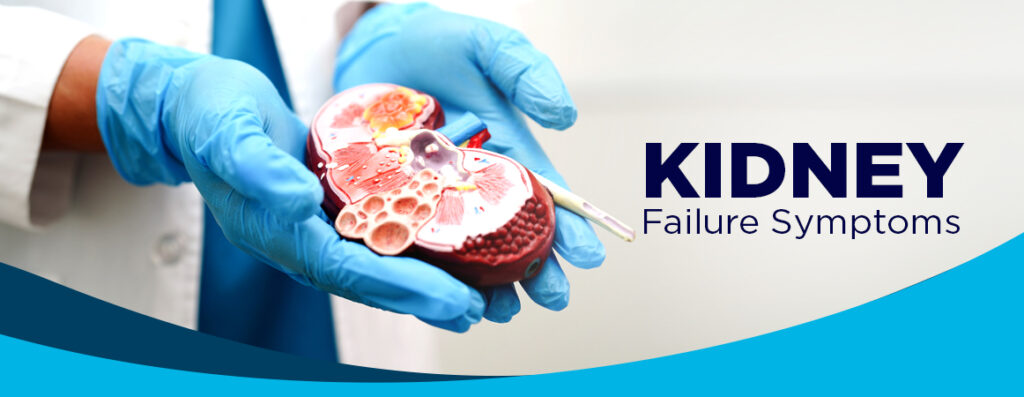Kidney Failure Symptoms
Kidney Failure Causes
The kidneys are essential for filtering waste, balancing electrolytes, and regulating blood pressure. When they fail, it’s often due to a combination of factors:
- Chronic Kidney Disease (CKD): This is a long-term condition where the kidneys gradually lose function. CKD is often caused by diabetes, high blood pressure, and glomerulonephritis.
- Acute Kidney Injury (AKI): This sudden loss of kidney function can result from severe infections, dehydration, medication side effects, or trauma to the kidneys.
- Diabetes: High blood sugar levels can damage the blood vessels in the kidneys, leading to diabetic nephropathy, a common cause of kidney failure.
- High Blood Pressure: Hypertension can damage the small blood vessels in the kidneys, reducing their ability to function properly.
- Glomerulonephritis: This is an inflammation of the kidney’s filtering units (glomeruli), which can impair kidney function.
- Polycystic Kidney Disease: A genetic disorder that causes cysts to form in the kidneys, eventually leading to kidney failure.
- Obstructions: Kidney stones, tumors, or an enlarged prostate can block the urinary tract, causing kidney damage.
Recognizing Kidney Failure Symptoms
Early detection of kidney failure symptoms is vital for timely intervention. Symptoms often develop gradually and can be subtle, making it important to be aware of the warning signs:
- Fatigue and Weakness: Reduced kidney function can lead to a buildup of toxins and impurities in the blood, causing feelings of fatigue and weakness.
- Swelling: Edema, or swelling in the legs, ankles, feet, or hands, occurs because the kidneys are unable to remove excess fluid from the body.
- Urination Changes: This can include increased or decreased urine output, dark or foamy urine, and frequent urination, especially at night.
- Shortness of Breath: Fluid buildup in the lungs, a condition known as pulmonary edema, can cause difficulty breathing.
- Nausea and Vomiting: The accumulation of waste products in the blood can lead to gastrointestinal symptoms like nausea and vomiting.
- Persistent Itching: Waste buildup in the blood can cause itching and dry skin.
- Chest Pain: Fluid buildup around the heart lining (pericardium) can cause chest pain.
- High Blood Pressure: Kidneys play a role in regulating blood pressure, so kidney failure can exacerbate hypertension.
Kidney Failure Treatment Options
Once kidney failure is diagnosed, several treatment options are available to manage the condition and prevent further damage. The severity of the ailment and the underlying cause determine the best course of action.
1. Medications
Certain medications can help control symptoms, manage underlying conditions like diabetes and high blood pressure, and prevent further kidney damage.
2. Dietary Changes
Lowering the amount of sodium, potassium, and phosphorus in one’s diet can assist ease the strain on the kidneys. Limiting protein intake is also often recommended.
3. Dialysis
Dialysis is required to remove waste from the blood when the kidneys can no longer filter waste properly.
- Hemodialysis: After being filtered by a device outside the body, blood is then brought back.
- Peritoneal Dialysis: The blood is cleaned inside the body using the lining of the abdomen as a filter.
4. Kidney Transplant
A kidney transplant might be the best choice in some circumstances. This involves surgically placing a healthy kidney from a donor into the patient’s body.
5. Lifestyle Modifications
Quitting smoking, maintaining a healthy weight, and regular exercise can help manage symptoms and improve overall health.
Managing Kidney Failure Symptoms
Managing kidney failure symptoms involves a comprehensive approach to maintain quality of life and prevent complications. Here are some strategies:
- Regular Monitoring: Frequent check-ups with a healthcare provider are essential to monitor kidney function and adjust treatment as needed.
- Fluid Management: Monitoring fluid intake and output helps prevent fluid overload, which can exacerbate symptoms like swelling and shortness of breath.
- Blood Pressure Control: Keeping blood pressure under control is crucial to slowing the progression of kidney failure.
- Anemia Management: Kidney failure can cause anemia, so treatments like erythropoiesis-stimulating agents (ESAs) and iron supplements may be necessary.
- Electrolyte Balance: Regular blood tests to monitor electrolyte levels are important, as imbalances can cause serious health issues.
Conclusion
Kidney failure is a serious condition that requires timely diagnosis and comprehensive management. Consult a doctor at MMI Hospital for comprehensive kidney testing. By consulting with a doctor at MMI Hospital, you can ensure a thorough examination of your kidney health and receive expert advice and treatment recommendations based on the latest medical standards. Don’t wait to take control of your health—schedule your appointment today for peace of mind and proactive care.
Post Disclaimer
The information contained in this post is for general information purposes only. The information is provided by "Kidney Failure Symptoms "and while we endeavour to keep the information up to date.
Legal Disclaimer
We do not claim to cure any disease which is considered’ incurable ‘ on the basis of scientific facts by modern medicine .The website’s content is not a substitute for direct, personal, professional medical care and diagnosis. None of the medicines mentioned in the posts ,including services mentioned at "medicineguide.us" should be used without clearance from your physician or health care provider.
Testimonials Disclaimer– : Results may vary, and testimonials are not claimed to represent typical results. The testimonials are real, and these patients have been treated with homeopathy treatment from our clinic . However, these results are meant as a showcase of what the best, Medicine can do with their disease contions and should not be taken as average or typical results.


